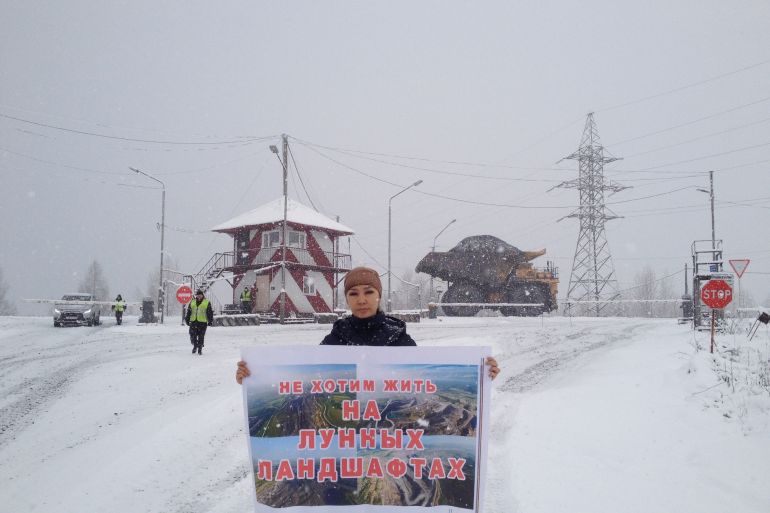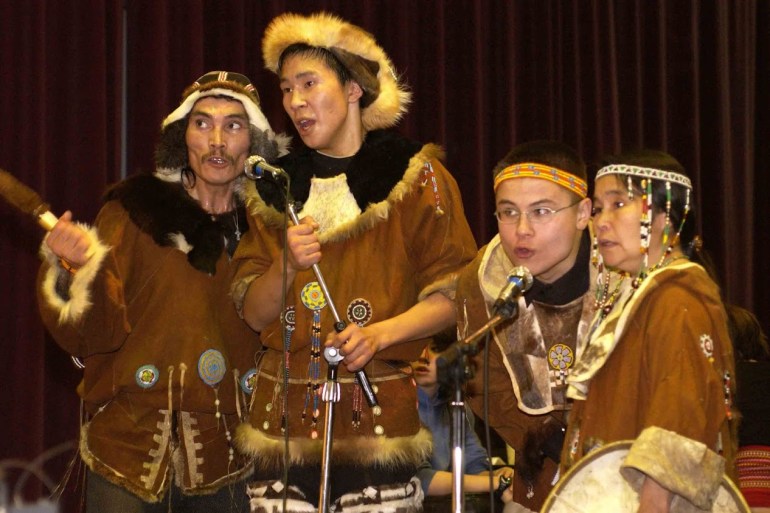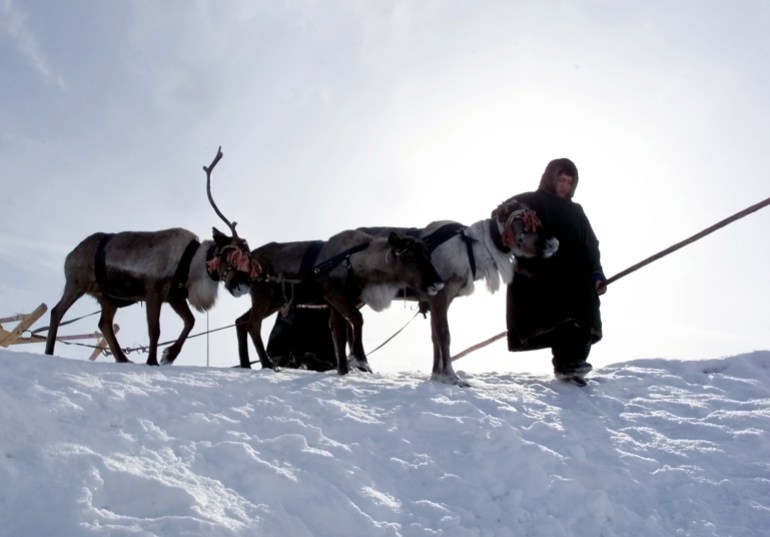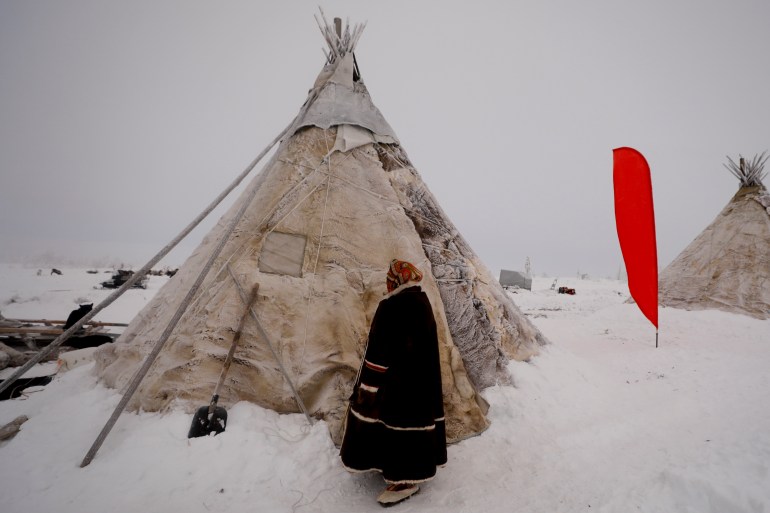In Russia, Indigenous land defenders face intimidation and exile
Pressure on communities comes as regional elites and big companies look to develop resource-rich Indigenous lands.

Listen to this story:
The police officers could have planted drugs in his backpack, Andrey Danilov says.
Keep reading
list of 3 itemsThe Last Soviet Generation
No, Putin is not becoming Stalin
So he refused to show its contents to the officers who did not identify themselves or say why they approached him in late August 2021 in the Arctic town of Monchegorsk in northwestern Russia.
Drugs planted by police have become a routine part of a crackdown on liberal opposition, independent journalists and human rights activists.
But Danilov is none of the above.
He is a community leader of some 1,600 Saami living in Russia’s Murmansk region near Norway. They are a fraction of the Saami Indigenous nation that primarily lives in Arctic Scandinavia in the region which the Saami call Sapmi, a place also known as Lapland and advertised to tourists as Santa’s home.
Danilov says the search and subsequent detention were part of perennial official pressure on him, payback for leading a campaign against platinum and palladium mining on Saami lands, and for his victory in July in the Constitutional Court which ruled that unlicensed hunting is the birthright of any Indigenous person as part of their traditional way of life.
Russian law suggests that only Indigenous people living in the wilderness and not in urban centres can hunt without a licence, but Danilov, who lives in the town of Severstal, proved that hunting is part of his culture and beliefs.
Danilov was released hours after the news of his detention reached other activists and independent media. But he knows the pressure is far from over.
“Their main goal is to either push me to flee abroad or to force me to shut up,” Danilov, 51, who is head of the grassroots group the Saami Heritage and Development Foundation, tells Al Jazeera.
In early November, 116 human and Indigenous rights groups and dozens of individuals signed an open letter to Russian President Vladimir Putin detailing the persecution of Danilov and other Indigenous activists across Russia. So far, the Kremlin has not replied.

A gold rush
Most of Russia’s Indigenous nations, as Indigenous groups are referred to in Russia, still rely on hunting and gathering, fishing and reindeer husbandry. But their lands – like those of other Indigenous communities from Papua New Guinea to Alaska – are treasure troves of fossil fuels, gold and other minerals as well as timber, game and fish.
And they are falling victim to a nationwide gold rush for these resources.
A warming Arctic, modern technologies and growing demand are opening up deposits previously deemed unavailable or too expensive to develop. As resources open up, the Kremlin, regional elites and big businesses including those owned by Putin’s former colleagues and neighbours or Kremlin-friendly oligarchs are eager to develop them.
“The development should be conducted in accordance with high ecological standards and with respect to the specifics of the local populations’ traditional lifestyle,” Russian Foreign Minister Sergey Lavrov said in May addressing the Arctic Council, an intergovernmental forum of eight countries including Russia.
But the development disrupts migration routes of wild animals or deer herds, spawning routes of fish, and destroys nesting grounds, sacred sites and burial grounds, Indigenous activists and observers say.
“For the Indigenous nations, their land is something sacred, they can’t live without the land, the fish, the forest, the tundra,” Danilov says.
Meanwhile, the developers increasingly ignore the United Nations Declaration on the Rights of Indigenous Peoples (UNDRIP) that prescribe their informed collective consent before any use of their land.
There is a scramble to develop the land for its resources, Danilov says. “And the Indigenous nations have simply become pawns in the big politics.”
As commercial interest grows, Indigenous activists fight the encroachment with the very limited means they have – protest rallies, lawsuits mostly lost in Kremlin-controlled courts, social media posts and appeals to independent media, rights groups and the UN.
In return, the activists face harassment, intimidation, arrests and surveillance by police and intelligence services, smear campaigns, destruction of property, accusations of “separatism” and exile, according to rights groups, the UN, independent media and court papers.
“Those who see the injustice towards their people, their nations, who simply discuss it, automatically get listed as people’s enemies,” Pavel Sulyandziga, an exiled community leader of the Udege, an Indigenous nation of some 1,500 that lives near the Chinese border, tells Al Jazeera.

Tigers and jade
Sulyandziga, 59, is a bearded, bespectacled former maths teacher who rose to become one of Russia’s top Indigenous rights officials in several government bodies and Indigenous groups in the 1990s.
His community’s land in Russia’s Far East is home to the Siberian tiger, the world’s largest cat. In the early 2000s, the black market price for one poached animal – whose body parts and even faeces are prized in Chinese medicine – exceeded $50,000, and they numbered several hundred.
But Putin took a shine to them and made headlines in 2008 after shooting a tigress with a tranquiliser to place a tracking device around her neck and creating a national reserve for the felines in the cedar forests where the Udege live, hunt and fish.
The reserve became a boon to the community that enjoys an uninterrupted electricity supply for the first time in their history and no longer has to worry about illegal logging and clandestine cannabis plantations because the preserve is protected by federal officials.
“They’ve never been better off,” Sulyandziga says.
But not him.
Pressure on Sulyandziga began after he organised public hearings on pressure on an Evenki Indigenous community that developed a jade mine on their ancestral lands in the taiga forest of the southeastern Buryatia region near Mongolia. Jade has been prized in China for millennia, and by 2010, the price of the semitranslucent stone exceeded that of gold.
In 2012, the mine was taken over by the Rostec state-run corporation focusing on defence and hi-tech.
That year, criminal charges were brought against community leaders, leading to confiscation of jade and land, activists say.
“Within months, the community was disbanded, some of its members were jailed, some were forced to leave Russia,” Dmitry Berezhkov, an Indigenous rights activist from the Itelmen nation that lives on the Pacific Peninsula of Kamchatka, tells Al Jazeera.
Since then, the community has faced expulsion from their land, community leaders said in a video appeal to Putin in 2019.
Sulyandziga claimed he was accused by state officials of “separatism”, “espionage” and embezzlement. His sons and brother, also an Indigenous rights activist, faced pressure too.
In 2016, Sulyandziga left for New York to deliver a speech at a UN session about Russia’s Indigenous rights situation. He says he never returned because a high-ranking security official told him that intelligence services planned to kill him and present his death as “suicide”.
Today he is an associate researcher at Bowdoin College in Maine and heads the Batani Foundation, an Indigenous rights group.
He says that since he left, pressure on Indigenous communities “rose dramatically”.
“If in the past intelligence services tried to at least pretend to make their actions look legitimate, now they simply don’t need to do that,” he says. “If in the past they tried to pressure leaders, now they pressure everyone who simply tries to tell the truth.”

Living on the edge
Russia’s 46 Indigenous groups are known officially as the “small nations of the North, Siberia and the Far East”.
They amount to less than 300,000 people, or 0.2 percent of Russia’s population of 144 million, but live in autonomies that are often larger than some European nations.
Some of these autonomies live on land covered by permafrost and tundra; some are nestled in the world’s largest forest, the Siberian taiga.
Their remoteness from urban centres and agricultural areas saved them from assimilation – even though since the Soviet era, the children of taiga nomads and hunters were often educated in Russian-language boarding schools where they were punished for speaking their mother tongues.
Putin has lauded the “small nations” for making Russia a diverse, multiethnic country and has on many occasions said the Kremlin promotes their legacy by funding the festivals of their culture and music, documentaries and cartoons based on their folklore.
“The unique diversity of [Russia’s] traditions and tongues is our common, priceless property that we value and take pride in, and the original culture of the people of North, Siberia and the Far East occupies a special place on this palette,” he said in April, addressing a forum of Indigenous people.
Even so, development on Indigenous lands and the subsequent environmental damage threatens the way of life, identity and spiritual beliefs of Indigenous groups.
The inevitable development-versus-preservation conundrum seen worldwide is exacerbated by the innate oddity of Russia’s economy, in which extraction and export of oil and natural gas resources play an outsized role, accounting for 36 percent of Russia’s budget revenues.
“Extraction of natural resources is Russia’s key business, and Indigenous people are its competitors, unwanted witnesses, they stall it,” says activist Berezhkov, who was granted asylum in Norway in 2013 after years of threats, surveillance, interrogations and alleged fraud charges.

Way of life under threat
In northwestern Russia, the inkblot-shaped Imlor Lake is for Khanty reindeer herders the burial place of the divine bear, a deity in their beliefs. But the Surgutneftegaz oil company drills crude oil from the lake, and the pollution forces Khanty to drive their herds elsewhere.
In 2017, a court in Surgut, the largest city of the Khanty autonomy, convicted Khanty shaman Sergey Kechimov of “murder threats” to the company’s security guards and sentenced him to community service. Kechimov, an activist who resisted the drilling for more than 10 years, said the guard dogs attacked his reindeer and he shot one of the dogs.
Some communities have lost their property and homes.
Yana Tannagasheva, a public school teacher and activist of the Shor Indigenous nation in southwestern Siberia protested against the expansion of coal and magnesium mining in her region of Kemerovo.
She wrote complaints to regional authorities and the Kremlin, and told a UN session on Indigenous rights in 2016 about an “ethnocide” of Shors.
Some residents of Kazas, a Shor village that once consisted of three dozen wooden houses by a pristine stream and nestled in the bright-green taiga forest full of berries and game, refused to sell their property to the mining company Sibuglemet.
In 2013, Tannagasheva says five houses were burned down and one was bulldozed, an ancestral burial ground was destroyed, and the nearby Karagay-Lyash mountain was blown up, where, according to Shor beliefs, a powerful spirit lived.
It also cordoned off what remained of the village that now stands empty in a “moonscape” of treeless land choked with coaldust that pollutes the rivulet, she says.
“They don’t see us as humans at all,” says Tannagasheva, 36.
She fled Russia in 2018 with her husband and two sons after years of surveillance by Center E, the anti-extremism police department, and interrogations by FSB, Russia’s main intelligence service.
“Authorities call us freaks and enemies although we simply wanted them to follow the law. We didn’t commit any crimes, and simply asked for access to our hometown, to save the graveyard where our forefathers are buried,” she says with indignation.
Sibuglemet’s press service did not reply to Al Jazeera’s request for comment.

Controlling activists
Officials and businesses easily dismiss the concerns and needs of the Indigenous nations citing efforts of Western NGOs advocating for communities to harm Russia’s “national interests” and strategic security.
“Foreign NGOs boost inter-ethnic tensions and extremism by promoting pro-Western liberal values, separatist sentiments, and fake information about the alleged abuse of rights of small Indigenous nations,” Nikolay Patrushev, head of Russia’s Security Council, said in May.
Boris Nevzorov, a former top official in Kamchatka, proposed in 2014 to restrict the fishing rights of the peninsula’s six Indigenous nations and claimed that they use “American funds” to stoke separatism.
“But the real reason is simple – Boris Nevzorov has a large fishing business, he accumulates fishing quotas and areas, wants to take them away from the Indigenous communities,” says activist Berezhkov.
Nevzorov, who currently serves as Kamchatka senator in Moscow, could not be reached for comment.
Indigenous nations face depleting fish resources and growing competition with the fishing company, Ustkamchatskryba, that Nevzorov still owns, and poachers protected by corrupt officials, Berezhkov says.
“Kamchatka’s Indigenous people are in a sad situation when it comes to fishing,” he says.
In 2020, the FSB started an online registry of each Indigenous person to monitor their rights to hunt and fish based on whether they live in the tundra or in urban centres.
The registry is also designed to identify and prevent “extremism”, which is punishable by up to 20 years in jail. Community leaders claim this step is aimed at intimidating and threatening activism.
“It is created to fully control the activists,” Danilov says.
Leaders have lambasted the registry because Indigenous people must prove their ethnic background and often cannot use the registry’s online services because they lack internet access or do not know how to use computers.
“With this registry, you will divide our people – [urban] intellectuals from the tundra people, children from parents, retirees from their grandchildren, wives from husbands,” Gennady Shchukin of the Arctic community of Turkic-speaking Dolgans told the Novaya Gazeta newspaper in 2020.

Small victories
At times, collective Indigenous dissent has been able to stand up to the Kremlin’s well-oiled propaganda machine.
The 40,000-strong Nenets reindeer herders form the largest of the “small nations” whose lands face the Arctic Ocean and contain nine-tenths of Russia’s natural gas.
After the Kremlin announced plans to merge their autonomy with the neighbouring Arkhangelsk region, it became Russia’s only federal district that voted against the 2020 nullification of Putin’s presidential terms that lets him stay in power until 2036.
The Kremlin scrapped the plans.
In November, dozens of community leaders and activists wrote an open letter to Elon Musk, who has said his Tesla company needs more nickel for electric car batteries.
“We are respectfully requesting that you do not buy any nickel, copper or other products of Norilsk Nickel” until it accesses the damage caused by its mining operations and a giant diesel fuel spill in the northern peninsula of Taymyr, the letter said.
Saami activist Danilov, who co-signed the letter, says it forced Norilsk Nickel to declare that it would go “green” by modernising their equipment to reduce environmental impact and emissions.
But Danilov believes the declaration is nothing but greenwashing.

Continued resistance
In its pursuit of resources and profits, the Kremlin and its business allies follow the logic of czarist-era colonisers whose conquest of Siberia, Alaska and a chunk of California (both sold to the United States in the 1800s) were driven by their quest for the fur of sables, foxes, ermines, otters and other animals, says Johannes Rohr, an expert on Indigenous affairs in Russia and project coordinator for the Institute for Ecology and Action Anthropology, a German NGO.
Known as “soft gold”, fur played a role in Russia’s exports and economy similar to today’s fossil fuels, he says. Cossacks, fur traders and czarist troops conquered Indigenous lands in ways that resemble the European colonisation of the Americas.
They crushed the resistance with firearms – while the Indigenous people had nothing but bows and arrows and spears. They imposed taxes on fur and introduced Orthodox Christianity – along with infectious diseases and alcoholism.
These days, the Kremlin sees any resistance to the development of resources on Indigenous lands as an existential threat, Rohr says.
“Back then, fur was collected from Indigenous peoples as tribute, and today, most oil is extracted in ancestral territories of Indigenous peoples. So, I guess, there is the idea that this [resistance] threatens Russia’s economic backbone,” says Rohr, who was barred in 2018 from visiting Russia for 50 years after a series of critical reports.
Communist Moscow gave Indigenous people university quotas and created collective cooperatives that specialised in fishing, hunting and animal husbandry that often destroyed traditional ways of life, annihilated property rights and restructured their communities.
They also purged or executed Indigenous elites such as shamans or wealthy reindeer owners, and the new elites were educated in “state-oriented” universities, Rohr says.
“Most of the Indigenous elites existing today, including the opposition-minded ones, are entirely state-oriented, their primary identity is that of Russian citizens, and there is no stable collective identity of Indigenous peoples” seen in countries like Peru or the US, Rohr says.
Despite this mindset, Indigenous activists confront the Kremlin in a David-versus-Goliath way – and some believe to improve the situation, Russia will have to live up to international standards of observing Indigenous rights.
“We will need to strive to build a system that will make possible the observation of Indigenous rights,” says Sulyandziga.